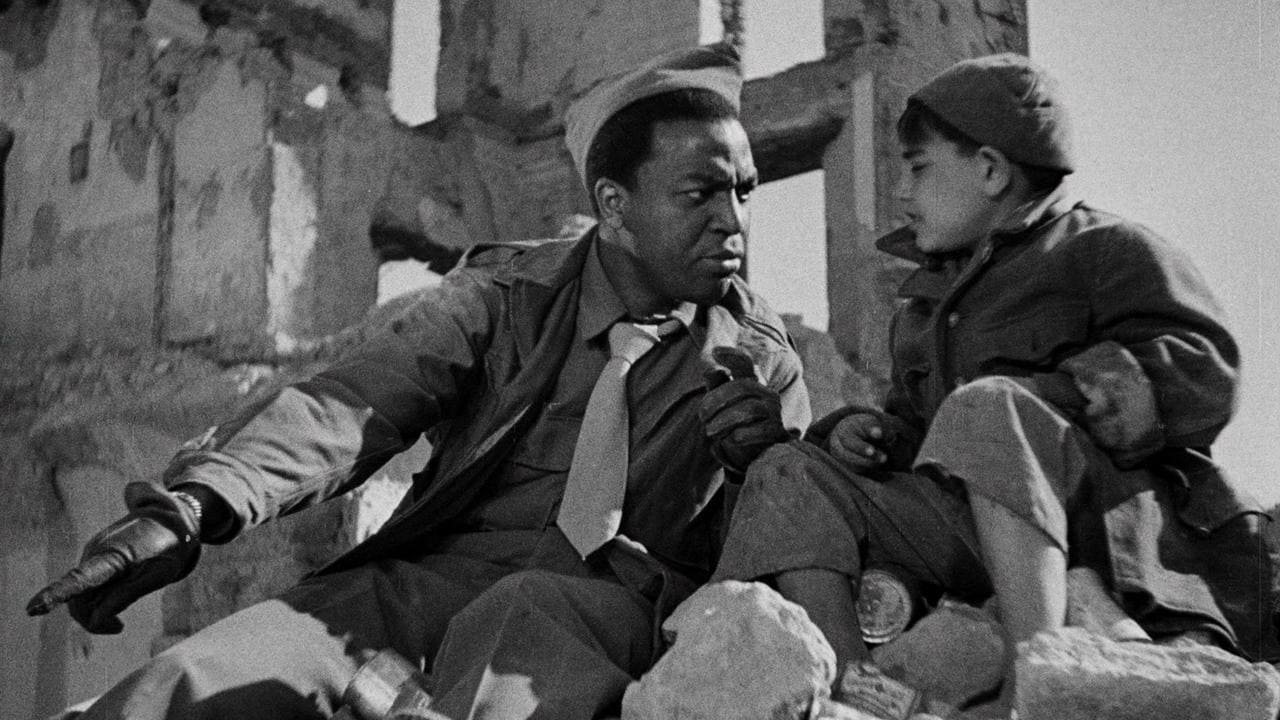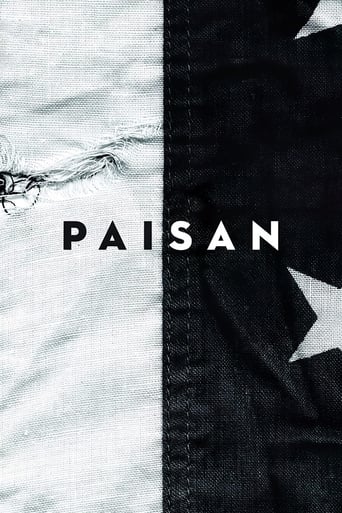



Such a frustrating disappointment
recommended
If the ambition is to provide two hours of instantly forgettable, popcorn-munching escapism, it succeeds.
View MoreClose shines in drama with strong language, adult themes.
View MoreHaving grown up amongst many folks of Italian descent, the term paisan, or pal, was quite familiar to me; especially when used by non-Italians to describe Italian friends of theirs. A similar meaning is conveyed with the use of the term as the title of the second film in Robert Rossellini's War Trilogy. Paisan (Paisá), from 1946, is not nearly as well known as Rome Open City, his first trilogy film, but it is a significantly better film, as well as being more truly a Neo-Realist film than its more melodramatic predecessor. Part of the reason is that the 126 minute film is episodic, so that the mawkishness and melodrama, that is inherent in many war stories, never gets to the point of overwhelm. Made and released a year after Rome Open City, Paisan often played on double bills with the earlier film when it was released in America. The film is set during 1943 and 1944, and each of the six episodes follows the Allies' chronological battles northward through Italy. Each episode highlights willful or mistaken miscommunication between the Allies, the Italians, and the Nazis. The film won many awards, in its day, but curiously languished while other Neo-Realist films became exalted as classics. While not, overall, a great film, three of the episodes reach heights that contain great moments, and these are enough to argue the film passes the near-great threshold, meaning reasonable arguments can be made in its favor. Those episodes are the third, the fourth, and the sixth and final one. The others range from bad to solid. All the episodes open with narration by Giulio Panicali.
View MoreIf there's one thing movies need, it's actors who can play the roles. Directors need people who are trained to perform their characters as best as the director visions them. Good actors get recognized and continue performing as well as they can. Yet, in the 1940s, Italian directors pioneered a certain form of filmmaking called "neorealism". This involved filming on location as opposed to a set and even had actual Italians performing the roles. Many of these had little to no experience acting, but the directors believed that their stories would be better told using actual Italians. Think of it as "for Italians, by Italians, starring Italians." One of the movies to incorporate this idea was Roberto Rossellini's post-WW II movie Paisan.A large number of people would think that something like putting actual Italians to tell this movie would be a pretty interesting idea, and it actually is. Rossellini took something that hadn't really been done before at the time. Many of his movies are pretty famous because of it, and the idea itself has been pretty influential. Paisan really is no exception. Instead of using Italian actors, Rossellini used actual Italians in different roles combined with American actors. It's a pretty ingenious idea in terms of filmmaking. Unfortunately, the movie feels a little dry. It's probably the realism of the movie or the stories that come across in the film.I say stories because the movie itself is actually a series of five vignettes as opposed to one full story. All of these have to deal with American soldiers in Italy after World War II. The first story deals with Americans in an Italian city who take one girl from the town to a seaside cliff. One of the soldiers tries to communicate with her but finds it hard because he doesn't know Italian. The second story is about a black American soldier who befriends a homeless boy that stole his boots. The third story has an American sleeping with an Italian prostitute musing about an Italian girl he used to love and tried to find again. He has no idea that the prostitute is the very girl. The fourth story has an American nurse meeting a painter who is a revolutionary leader named "Lupo". They struggle to get across the Ponte Vecchio and to safety. The last story is about American soldiers who are captured by the Nazis and executed before the war was over.The interesting thing about this movie is that because these are actual Italian people portraying Italian people, it appeared as if they were Italian people. The little boy wasn't trying too hard to play a poor Italian boy because well, he IS one. However, it's easy to tell that there is no experience with these people. The prostitute could have been done by an Italian actress, one who didn't really say her lines really monotonously. She realized who the guy she had was; she could be a little more shocked. The American actors were fine. Many of them felt like they actually were their characters as opposed to just acting them out. This makes it more interesting and even improves their acting. It's one thing to communicate with someone you know is faking it as well; it's another to communicate with someone who probably isn't. You have to be convincing enough to them, and that makes you convincing enough for the audience.The ideas of communication and friendship are very heavy in this movie. The Italians are speaking Italian, but many of the Americans don't understand and find it hard to connect with these people. Rossellini tries to emphasize that in the first story. The Americans in the other stories knew some Italian, but it was the ignorance of the other Italian characters that cost them. The soldier with the boy didn't realize that the boy was homeless from the war and became mad at the boy when he stole his boots. The soldier with the prostitute didn't trust her judgment, and the story doesn't end too well for the both of them. The same can be said about the fourth story. Connecting with the people around you is important in these stories, and it becomes even easier if you understand them.Unfortunately, this movie is a bit dry for me. When you try to make a story as real as humanly possible, you wind up making it so real that it feels like you're there. That works on numerous occasions such as mystery thrillers or suspenseful films, but these stories do come across as boring at times. The pacing of the movie has some part to play as the stories seem to go on and on. By the time something exciting or really dramatic happens, the scene is over. That may have been Rossellini's intent, but it doesn't help when there's nothing to keep us wanting to see these stories continue.Bottom line: Paisan is a potentially good showcase because it uses potentially interesting concepts. The realism in the acting and the set really make the movie convincing. The ideas about communication and connection really do come across in the stories, but the stories don't pace well and have very little dramatic worth. The filmmaking ideas are influential and have good intents, but it helps when the story itself is interesting. Not everyone is an aspiring filmmaker, but those who are can learn a lot from this movie.
View More**spoiler alert** Paisa is a vivid example of Italian Neo-Realism. I found this movie interesting, but also very heart wrenching, and sad thorough out most of the film. The film first captures the audience with a bar fight between two females fighting over a soldier. Then quickly moves to a different scene of soldiers being welcomed to town by a group of locals. The plot thickens as one of these soldiers is welcomed upstairs by a youthful female for water. They begin speaking but their time is cut short due to the soldiers duties, but it is very clear that these characters are already mesmerized by each other. Without skipping a beat, the movie quickly jumps to another plot of a women attempting to find her husband during a war. I feel that Rossellini captures the realism here with the staging of the scene. The war has ravaged most of the town's buildings creating a "ghost town", and the hysteria of the people is shown as they move through the town fearful of their lives. The black and white shooting of this film helps display a dark, critical time in the everyday lives of the soldiers and commoners. The buildings are falling apart; the paver's show stains of blood, the soldiers wait in suspense for another battle. The film continues to showcase drama, and intensifies as the women faces not knowing if her loved one is alive or deceased. Although, she hears different stories of her husband's location and details she continues seeking help from soldiers and a friend after hiding with commoners inside a building. The film remains suspenseful and shows the lady finding her husband, but sees her friend hurt in the process. After all of this the film returns to the first "love story", but ultimately ends horribly due to the war. This film is one of the best war movies I have seen. Although it jumps to different stories each one is related due to the war; showcasing the effects war has on our species.
View MoreEarly in the film, the girl from the church who guides the Americans sounds just like the girl from Godfather II who Michael marries while hiding in Sicily. They're both young and Sicilian. If it were just their voices, I could never tell the difference. Not just voice, but their attitude and demeanor are the same. I've never been to Sicily, but this seems to confirm what a young Sicilian woman sounds like. This authenticity really adds to the goal of Italian neo-realism; the goal of capturing real human behavior and shying away from an actor's "fake" portrayal.Rossellini uses actors and non-actors in the film. It is difficult to separate the two. I think I can safely say all the characters with no dialogue are non-actors. They are extras, hired, dressed (maybe in their own clothing), and placed where need be. The rest with dialogue are harder to distinguish as either actor or non-actor. All the lines seem to be delivered in an amateur way. Even those that may be actors seem to make efforts to seem as stiff and natural and real as would a non-actor appear to be. Close-ups may be the only give away. And this is not always sure. There is a close-up of the Sicilian girl that really shows her emotion and deliberation of what she is about to do. Again, am I deceived? Is she actor or non-actor? At this point, it seems not to matter except for the fact that all the characters are seamlessly woven into the story. There are none who give an obvious performance. There are none who stick out or are identifiable were it not for the credits, which I don't pay attention to anyways. What remains is praise for Rossellini's vision and execution.
View More